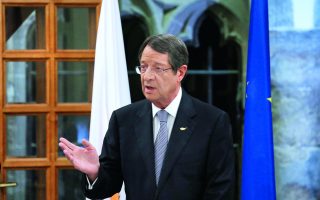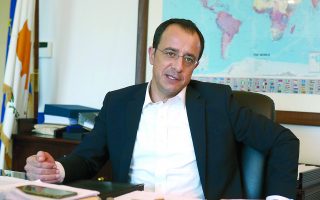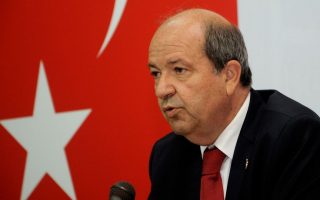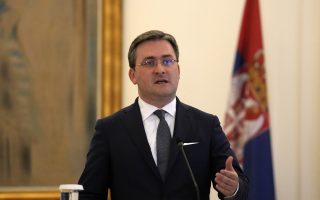Nicosia turns the page in Cyprus peace talks
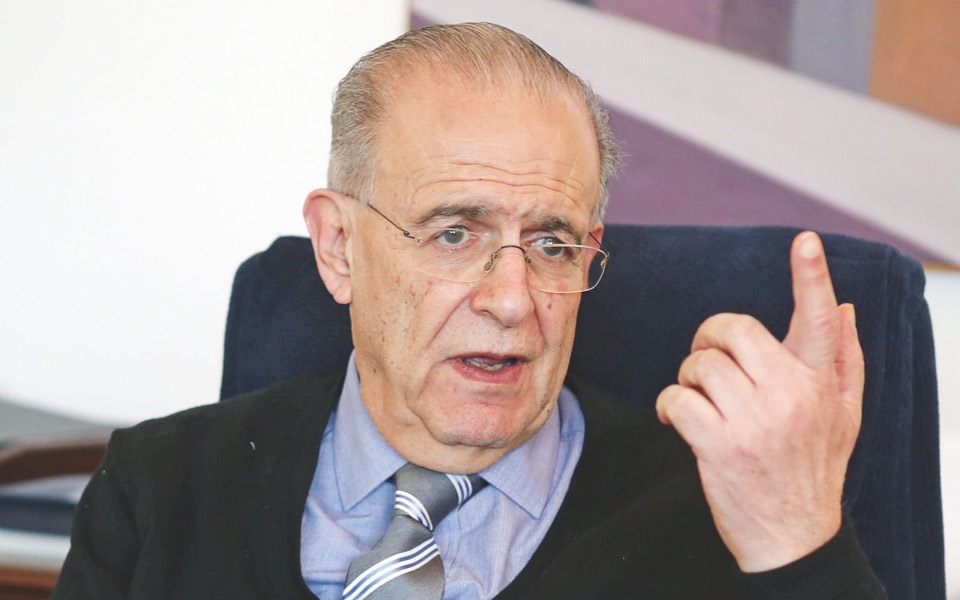
Nicosia plans to present a series of ambitious confidence building measures (CBMs) in a bid to restart peace talks with the Turkish side, Cyprus’ new foreign minister, Ioannis Kasoulides, tells Kathimerini, saying that the government has reviewed its sanctions policy, which had been the cornerstone of its approach.
Asked to comment on why he believes Ankara would agree to CBMs this time around, Kasoulides says that he has reason to believe from discussions in Washington and Brussels that both the United States and the European Union would help in this direction.
He adds that the mood toward Nicosia has shifted in recent weeks, while indicating that saving Famagusta is an issue of the highest priority, even if it means paying a significant price.
Many analysts suggest that your comeback to politics signals a return to realpolitik in Nicosia. Do you agree?
I have said that our foreign policy is not changing since day one.
Has there been a tacit agreement with President Nicos Anastasiades to restart peace talks with Turkey?
It is not a tacit agreement. Before accepting [the post of foreign minister] I wanted to discuss the issue with him and we did. It is the president who sets the [policy] direction.
There are a host of unresolved issues, one of which is the matter of sanctions. Do you believe that this policy needs to be reviewed, in light of its failure?
We have already reviewed the policy of sanctions. Cyprus’ demand for sanctions will not be withdrawn, but the discussion at the political level, at the Foreign Affairs Council level has been exhausted as certain member-states do not want to impose sanctions on Turkey. They argue that they are counterproductive, they will not make Turkey change its position on Varosha and that what is needed is confidence building measures. So, they will look at our policy. Instead of sanctions, we will present CBMs.
Will they help, though? CBMs have been rejected in the past.
That’s right. But if you look closely at the conversation taking place in the Turkish-Cypriot community, you will see that it is not easy for them to reject a proposal out of hand, without studying it first. Especially when their main narrative is complaining to the world about their “isolation” and the embargo against them, as they see it. The lifting of these two factors, and the transfer of Tymbou airport to the jurisdiction of the United Nations, will work to the benefit of the Turkish Cypriots’ progress and prosperity.
Is there a specific plan with regard to the airport?
Of course, but what we will talk about first is whether they are ready to talk. The main thing we are asking in return for such a big step is that the fenced-off part of Varosha is surrendered to the United Nations, as per the relevant Security Council resolutions, so that it can then be handed over to the area’s legitimate inhabitants.
Does this also include the port of Famagusta?
The package of Anastasiades’ proposals includes the port of Famagusta, whose customs authority will be put under the supervision of the EU to control the entry of goods into the single market. For these two things to happen, Turkey will have to fully implement the additional Ankara Protocol and, therefore, open ports and airports to vessels flying Cyprus’ flag.
What has been the response from Washington and Brussels? Will they help?
The proposal for confidence building measures met with a positive reaction from Secretary of State Antony Blinken and even more so from Under Secretary of State for Political Affairs Victoria Nuland, who showed her willingness to help. As far as Brussels is concerned, I presented the president’s ideas to the ambassadors’ lunch under the French Presidency and the reactions were very positive. I think that Berlin, Paris and other capitals that can wield some influence will be ready to help.
Does this focus on CBMs mean that a restart of reunification talks by the end of Anastasiades’ term in office is off the table?
It would be great if the Turkish side changes its position so that talks could resume, because its position is that we must accept Turkish sovereignty and a two-state solution even before any talks can begin. So, hopefully Turkey will shift positions. And if, in the meantime, CBMs were also implemented, just imagine the kind of atmosphere this will have created and what an effect it would have on the mood among the people of Cyprus (Turkish- and Greek-Cypriots), who have no expectations at all right now. CBMs can create a climate to great expectations with regard to a solution and prepare the ground for the next step.
Given how ambitious these CBMs are, what are the real expectations? That they will improve Cyprus’ position vis-a-vis the international community?
The president wrote to the UN secretary-general in December proposing these CBMs and since then our diplomatic services have been engaged in a major campaign to promote the idea to all foreign governments at every international forum.
So, the issue is about communication? Not credibility?
I have noticed a marked shift in the mood and expectations of the international community over the past few weeks. Without pointing the finger, we seem to have passed on from a phase when credibility may have been lacking to a new one, which gives me hope of better prospects over the weeks or months ahead.
What are your views on the recent rapprochement between Israel and Turkey? How will it affect Cyprus and Greece?
What I know is that when you cement a friendship on the basis of principles, you have to trust your partner not to abandon you in the course of improving relations with Turkey.
So, the friendship is solid?
No one has ever said that my enemy’s enemy is my friend. That is not how it works. We trust the government of Israel.
So, we are not worried by this development?
The president of Israel will be traveling to Ankara, but will visit Greece and Cyprus first.
What were the takeaways from your trip to Washington at the start of the month?
We received assurances from the US secretary of state that the 3+1 partnership [Cyprus-Greece-Israel with US support] will continue at the political level and that all other efforts at a lesser level will be guided by the higher political level. We are also assured that bilateral relations built over issues of security and defense, and training and personnel, over efforts to evacuate US citizens from the Middle East and over a series of other issues will also continue. Given that Turkey won’t even let us onto NATO’s doorstep, we have expressed our desire to the United States to at least increase relations between our two countries.
